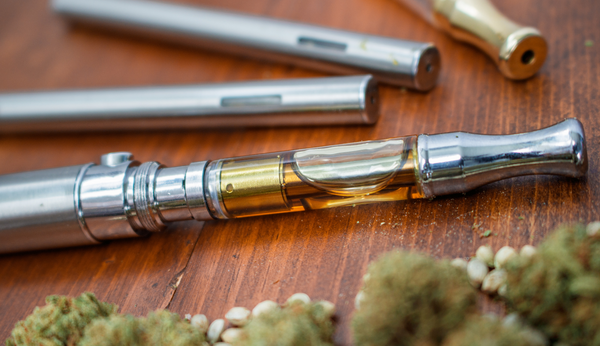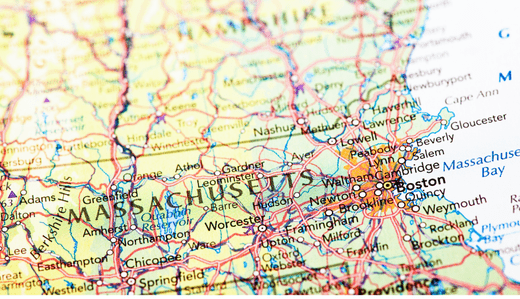Your Cart is Empty
FREE SHIPPING ON ALL ORDERS $75+
Hemp-derived cannabinoids are continually gaining popularity, and one in particular has recently been in the spotlight. Delta-8-THC, a mildly psychoactive cannabinoid derived from hemp, is legal by federal law.
But is Delta-8-THC legal in Massachusetts? And if so, where can you find it?
Unfortunately, Massachusetts hemp laws are pretty convoluted, so it can be difficult to fully understand the truth about of Delta-8 legality in the state. Here's what we know:
Disclaimer: We’re always working to stay informed on the latest Delta-8 laws and research. However, state laws are subject to change and we advise that you do your own research to verify the information you find in this article. This is not intended as legal advice.
Table of Contents
Delta-8-THC and Federal Laws
Massachusetts Delta-8-THC Laws
Is Delta-8 a Controlled Substance in Massachusetts?
Delta-8-THC Possession Limits in Massachusetts
Is Delta-9-THC Legal in Massachusetts?
Where to Buy Delta-8 in Massachusetts
Do You Have to Be 21 to Buy Delta-8?
Is Delta-8 Legal in All 50 States?
Resources
Massachusetts passed several amendments to the state’s laws after the 2018 Farm bill became federal law. In addition to legalizing hemp and CBD, the state also aligned it’s legislation with the federal definition for hemp. That means that hemp, or Cannabis Sativa material with less than 0.3% Delta-9-THC by dry weight, and all of its cannabinoids, isomers, salts, salts of isomers, and other derivatives are legal in the state.
To further clarify the new hemp rules, Massachusetts specified that “tetrahydrocannabinol,” where they are addressed by state law, does not include THC derived from hemp. This is similar to the laws used by neighboring states where Delta-8 is legal, like Connecticut and New York.
But there's a catch. The state has spoken out about Delta-8 specifically, and they claim that it is not a THC derived from hemp. Here's the states official statement on the legality of hemp-derived Delta-8 products, taken directly from the state website:
"Because delta-8 THC is not naturally occurring in hemp (except for possible trace amounts), to produce delta-8 THC in commercial quantities it must be derived from hemp synthetically. While the Farm Bill did remove hemp from the Controlled Substances Act, it did not impact the control status of synthetically derived cannabinoids, thus delta-8 THC remains a controlled substance, regardless of the source. As a result, we do not allow hemp-derived delta-8 THC products to be processed or sold in Massachusetts."
In other words, Delta-8 derived from hemp may not be legal to buy or sell in the state. There seem to be no criminal penalties defined for possession of hemp-derived Delta-8, however.
The state has legalized cannabis and cannabis-derived THC products, including Delta-8 from cannabis material. Of course, cannabis products should be bought in a state-registered dispensary.
So? Is Delta-8 legal in Massachusetts? Yes, but you may need to buy it at a cannabis dispensary.
Here are some highlights from Massachusetts state law:
SECTION 3.
“Cannabidiol” or “CBD”, the compound by the same name derived from the hemp variety of the Cannabis sativa L. plant.
“Hemp”, the plant Cannabis sativa L. and any part of that plant, including the seeds thereof and all derivatives, extracts, cannabinoids, isomers, acids, salts, and salts of isomers, whether growing or not, with the federally defined THC level for hemp. Hemp shall be considered an agricultural commodity.
Agriculture Improvement Act of 2018
Effective Date: 10/31/2019
“hemp” means the plant species Cannabis sativa L. and any part of that plant, including the seeds thereof and all derivatives, extracts, cannabinoids, isomers, acids, salts, and salts of isomers, whether growing or not, with a delta-9 tetrahydrocannabinol concentration of not more than 0.3 percent on a dry weight basis.
“Hemp Products”, all products with the federally defined THC level for hemp derived from, or made by, processing hemp plants or plant parts, that are prepared in a form available for commercial sale, including, but not limited to cosmetics, personal care products, food intended for animal or human consumption, cloth, cordage, fiber, fuel, paint, paper, particleboard, plastics, and any product containing one or more hemp-derived cannabinoids, such as cannabidiol.
“Industrial Hemp”, the equivalent in all meanings to hemp, as defined in this section.
“Tetrahydrocannabinol” or “THC”, notwithstanding any other provision of the law, the THC that is found in hemp shall not be considered to be THC in qualifying as a controlled substance.
Section 121.
The department may inspect and have access to the equipment, supplies, records, real property and other information deemed necessary to carry out the department’s duties under sections 116 to 123, inclusive, from a person participating in the planting, growing, harvesting, possessing, processing, purchasing or researching of hemp, industrial hemp. The department may establish an inspection and testing program to determine delta-9 tetrahydrocannabinol levels and ensure compliance with the limits on delta-9 tetrahydrocannabinol concentration.
Section 122.
(a). Hemp-derived cannabinoids, including CBD, are not considered controlled substances or adulterants.
(b) Products containing one or more hemp-derived cannabinoids, such as CBD, intended for ingestion are to be considered foods, not controlled substances or adulterated products.
(c) Retail sales of hemp products may be conducted when the products and the hemp used in the products were grown and cultivated legally in another state or jurisdiction and meet the same or substantially the same requirements for processing hemp products or growing hemp under the State Hemp Program.
 Is Delta-8 a Controlled Substance in Massachusetts?
Is Delta-8 a Controlled Substance in Massachusetts?In Section 122 (a) of the state’s Agricultural Improvement Act, the legislation specifically declares that “hemp-derived cannabinoids, including CBD, are not considered controlled substances or adulterants.” The state’s legislation also states that “THC that is found in hemp shall not be considered to be THC in qualifying as a controlled substance.”
However, the state suggests, contrary to federal law, that Delta-8 is not a "natural hemp product," so it is unclear how they may classify Delta-8 material derived from hemp.
The state of Massachusetts does not have any possession limits in place for hemp-derived products, including Delta-8-THC. They have a limit of one ounce of legal marijuana flower for adults age 21 and over.
In 2012, Massachusetts voters passed Question 3 by popular vote, an act which established the state’s medical marijuana program. Later in 2016, the state also passed Question 4 by popular vote, an act that began the legalization process for adult use of cannabis in Massachusetts.
Now, cannabis is accessible to qualifying medical patients for medicinal use and to adults 21 and older for recreational use. Massachusetts has some cannabis regulations in place, and cannabis possession of over 1 ounce is not allowed outside of your home.

According to state hemp laws, legal hemp products can be sold in the state so long as it is produced in accordance with the state’s hemp plan. However, the state has spoken out against the sale of hemp-derived Delta-8 products. You may need to purchase Delta-8 products in a state-registered dispensary.
Still, it’s advisable to proceed with caution when choosing a Delta-8 distributor. While you can likely find various hemp products in local stores, there may be benefits to buying Delta-8 online. One reason is that you can buy directly from a brand or manufacturer, instead of purchasing through a third-party vendor that may not fully understand Delta-8 effects and uses or the laws surrounding Delta-8 products.
At Vida Optima, our Delta-8-THC products comply with all parameters of the Hemp Farming Act of 2018. We can also help answer questions about Delta-8 before you buy, or you can read our “What is Delta-8-THC?” guide to learn everything you need to know.
There are no state regulations that place age restriction on the purchase of hemp-derived products. Consumers must be at least 21 years of age to shop at legal cannabis dispensaries.
Delta-8-THC is currently federally legal under the context of the Hemp Farming Act of 2018, but each state has the right to determine their own stance on tetrahydrocannabinols derived from hemp. Delta-8-THC is legal in Massachusetts according to state law (with some restrictions), but you should read more about Delta-8 laws by state to determine the legality in other areas.
Comments will be approved before showing up.



